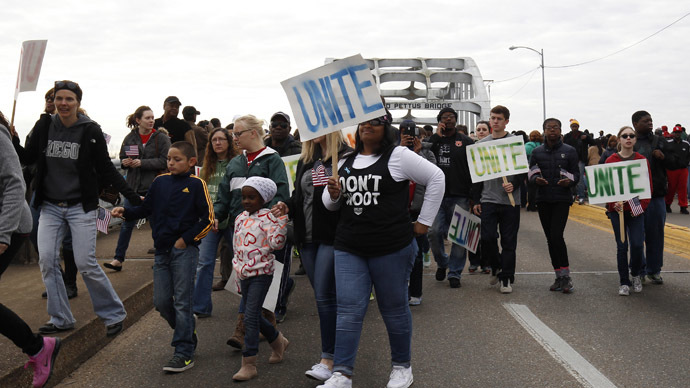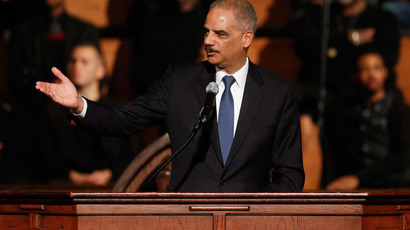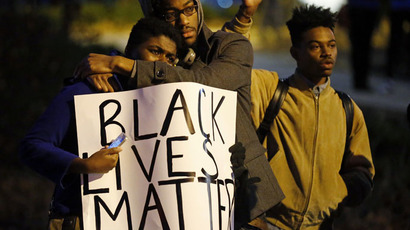‘Black lives matter’: 70,000 march across ‘Bloody Sunday’ bridge in Selma (PHOTOS, VIDEO)

An estimated 70,000 people have taken part in the 50th anniversary commemorations of the 1965 Bloody Sunday march across a bridge in Selma, Alabama – an event which marked a turning point in the US civil rights movement against racial discrimination.
Singing hymns and holding signs bearing slogans such as “black lives matter, all lives matter,” the crowd slowly made their way across the symbolic Rubicon on Sunday. The rally was so large that many appeared barely able to move as the stream carried them across the Edmund Pettus Bridge.
Half a century ago, on March 7, 1965, some 600 civil rights activists marched east out of Selma on US Route 80. They had only got only as far as the Edmund Pettus Bridge, six blocks away, when state and local policemen attacked them with billy clubs and tear gas, driving the crowd back into Selma.
Two days later, Martin Luther King, Jr., despite a restraining order, led a symbolic march to the bridge. In the same month, about 25,000 civil rights activists sought court protection for a third, full-scale march from Selma to the State Capitol in Montgomery.
Activists’ endeavors and perseverance forced the then-president Lyndon Johnson to sign the Voting Rights Act of 1965 which put an end to racial discrimination in voting.
Meet the Selma foot soldiers who are still marching today http://t.co/g5lcYNH0m4pic.twitter.com/Kq8BJkYqC9
— ThinkProgress (@thinkprogress) March 9, 2015
US Attorney Eric Holder participated in the traditional service Sunday morning service in Selma before addressing the crowd as he spoke of the past and the motivations of those who marched 50 years ago.
Holder noted that the Civil Rights Act gave African-Americans historic protections, but without “real political power, people of color continued to be marginalized, stigmatized, brutalized, and denied their very humanity.”
Fifty years ago he said, civil rights movement was “spurred by the murder of Jimmie Lee Jackson – an unarmed young black man.”
He repeated those words “unarmed black man,” referring to 18-year-old Michael Brown, who was gunned down by a white police officer in Ferguson, Mo. last year, and Eric Garner who was choked to death by the cops in New York – incidents which sparked protests and calls for change in modern-day US.
Ferguson protesters in Selma: The Civil Rights Movement isn't just for history books. http://t.co/ixgu7GHu9Fpic.twitter.com/uuZKDoKC9w
— Mashable (@mashable) March 8, 2015
Civil Rights activist, Martin Luther King III, the son of the prominent Martin Luther King, Jr., said just as much work needs to be done today as it did 50 years ago.
“This means standing up, and speaking out, for the civil rights to which everyone in this country is entitled,” he said. “It means calling attention to persistent disparities and inequities. And it means working tirelessly to safeguard and to exercise the right to vote.”
President Barack Obama visited Selma on Saturday to tell the nation that the civil rights movement needs to continue in the face of ongoing racial tensions across the nation.
“Fifty years from Bloody Sunday, our march is not yet finished, but we're getting closer,” said Obama.
An anniversary march from Selma to Montgomery is set to begin Monday morning and culminate in a rally at the Alabama Capitol Friday afternoon.














